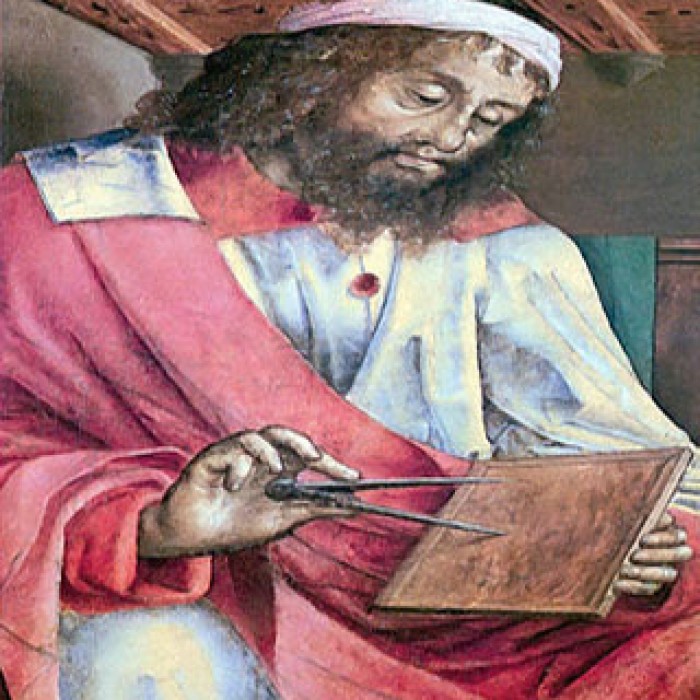
Euclid (300 BCE), sometimes called Euclid of Alexandria to distinguish him from Euclides of Megara, was a Greek mathematician, often referred to as the "father of geometry".
His Elements is one of the most influential works in the history of mathematics, serving as the main textbook for teaching mathematics (especially geometry) from the time of its publication until the late 19th or early 20th century.
In the Elements, Euclid deduced the principles of what is now called Euclidean geometry from a small set of axioms.
Euclid also wrote works on perspective, conic sections, spherical geometry, number theory and rigor.
Euclid is the anglicized version of the Greek name Εὐκλείδης, which means "renowned, glorious".
He was active in Alexandria during the reign of Ptolemy I (323–283 BCE).
The date, place and circumstances of both his birth and death are unknown and may only be estimated roughly relative to other people mentioned with him.
He is rarely mentioned by name by other Greek mathematicians from Archimedes (c. 287 BC – c. 212 BC) onward, and is usually referred to as "ὁ στοιχειώτης" ("the author of Elements").
The few historical references to Euclid were written centuries after he lived by Proclus c. 450 AD and Pappus of Alexandria c. 320 AD.
According to Proclus, Euclid belonged to Plato's "persuasion" and brought together the Elements, drawing on prior work by several pupils of Plato (particularly Eudoxus of Cnidus, Theaetetus and Philip of Opus.)
Although the apparent citation of Euclid by Archimedes has been judged to be an interpolation by later editors of his works, it is still believed that Euclid wrote his works before those of Archimedes.
In the only other key reference to Euclid, Pappus briefly mentioned in the fourth century that Apollonius "spent a very long time with the pupils of Euclid at Alexandria, and it was thus that he acquired such a scientific habit of thought" c. 247–222 BC.
A detailed biography of Euclid is given by Arabian authors, mentioning, for example, a birth town of Tyre. This biography is generally believed to be completely fictitious.
Although many of the results in Elements originated with earlier mathematicians, one of Euclid's accomplishments was to present them in a single, logically coherent framework, making it easy to use and easy to reference.
The geometrical system described in the Elements was long known simply as geometry, and was considered to be the only geometry possible.
Today, however, that system is often referred to as Euclidean geometry to distinguish it from other so-called non-Euclidean geometries that mathematicians discovered in the 19th century.
In addition to the Elements, at least five works of Euclid have survived to the present day.
Although best known for its geometric results, the Elements also includes number theory.
There is no mention of Euclid in the earliest remaining copies of the Elements, and most of the copies say they are "from the edition of Theon" or the "lectures of Theon", while the text considered to be primary, held by the Vatican, mentions no author.
The only reference that historians rely on of Euclid having written the Elements was from Proclus, who briefly in his Commentary on the Elements ascribes Euclid as its author.
Source: Link

1564 - 1616

1803 – 1882

1854 – 1900

1942 – 2016

1928 – 2014

1835 – 1910

1869 – 1948

1884 – 1962
1898 – 1963

1929 – 1993

1879 – 1955

1809 – 1865

1807 – 1870

1800 – 1859

1795 – 1821

1755 – 1793

1984 -

1989 – 2011

1943 – 2001

1815 – 1902

1929 – 1994

1767 – 1848
